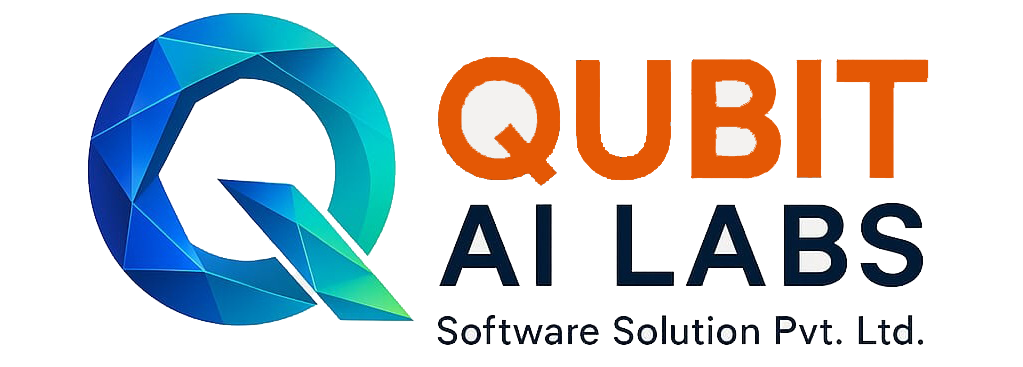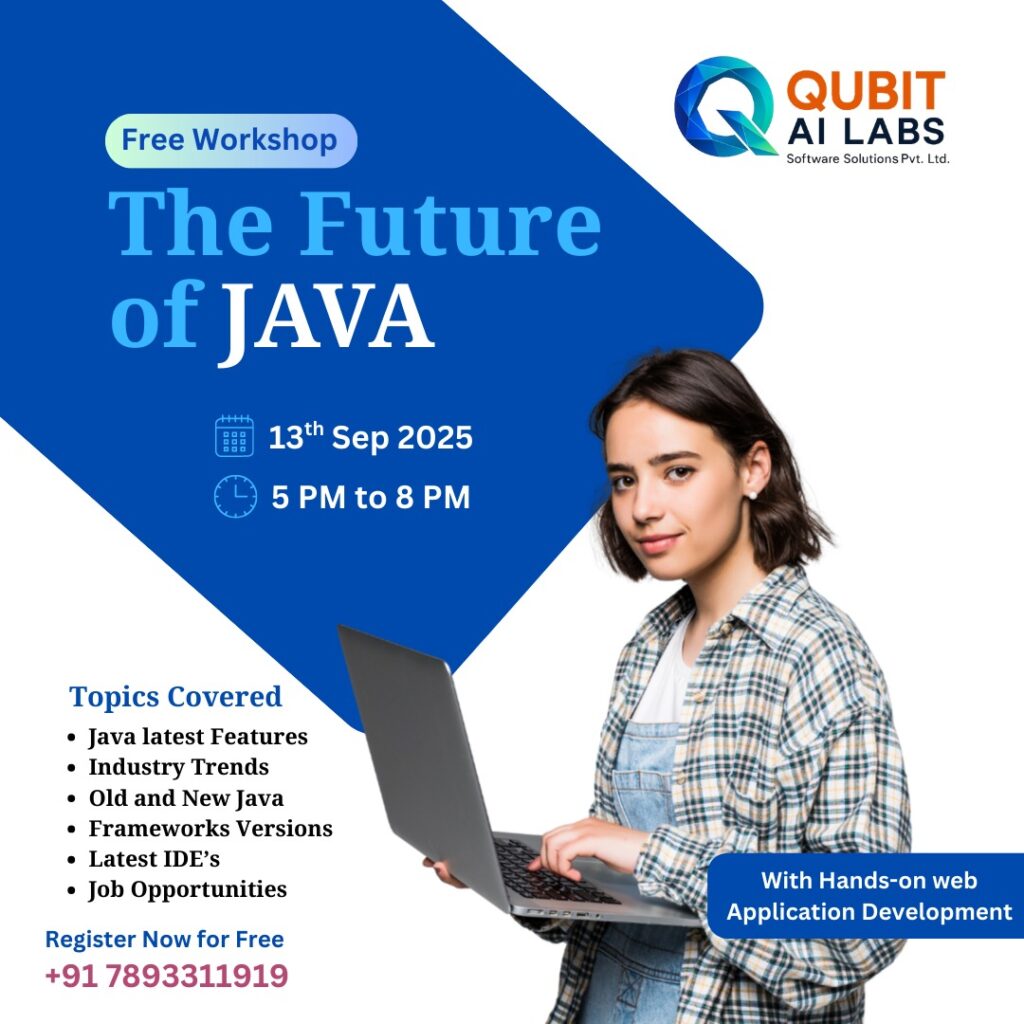Best Java Training & Course in Hyderabad
Welcome to Qbit AI Labs, the premier destination for Java training in Hyderabad. Whether you are a beginner looking to master the fundamentals of Java or an aspiring developer aiming to become a skilled Java full-stack professional, we have the perfect course for you.
Register Now

Course Overview
Our Java Course in Hyderabad is designed to provide hands-on experience with real-world projects, ensuring you gain practical knowledge alongside theoretical concepts. With expert trainers and a structured curriculum, we empower you to build robust applications and enhance your career prospects.
Join our Java full stack developer course in Hyderabad to dive deep into the world of programming, web development, and enterprise-level application building. From core Java to advanced frameworks, we cover it all, making you job-ready in today’s competitive IT industry.
Start your journey to success with the best Java course and take your coding skills to new heights. Enrol today and transform your future!
Our Java Course in Hyderabad is a comprehensive program designed to equip you with the skills and expertise required to excel in the IT industry. This course covers every aspect of full-stack development, starting from core Java programming to advanced frameworks and tools.
Key Highlights
Core Java Mastery
Build a strong foundation in Java by learning essential concepts like object-oriented programming, collections, exception handling, and multi-threading.
Front-End Development
Learn front-end technologies such as HTML, CSS, JavaScript, and frameworks like Angular or React to create dynamic and responsive user interfaces.
Back-End Development
Master server-side development with Spring Boot and Hibernate for creating scalable, secure, and efficient applications.
Database Management
Gain hands-on experience with databases like MySQL or MongoDB, including data modelling, query optimization, and integration.
Version Control & Deployment
Understand Git for version control and deploy your applications using tools like Docker and cloud platforms.
Real-World Projects
Work on industry-relevant projects to apply your skills and build a portfolio to showcase to potential employers.
Key Features
- Comprehensive learning
- Hands-on projects
- Industry-relevant skills
- Certification
- Experienced instructors
- Job assistance
Skills Covered
Front-End Development
Back-End Development
Version Control
Deployment
Security
Agile Methodologies
Project Management projects
Soft Skills
Eligibility
Any Degree – B. Tech, BSc, B. Com, BBA, etc
All IT & Non-IT Branches – CSE, EEE, Civil, Mech, Bio, etc.
Coding knowledge is required
No CGPA cut-off. Career gap is not a barrier.
Course Curriculum
Core Java
- Java Language Syntax
- Flow Control using Condition Blocks and Conditional Loops
- Arrays & Strings
- OOPS
- Exceptions
- File IO
- Collections & Utility Classes
- Multi-Threading
- Networking Basics
- Java 8 till 17 Features
Structured Query Language using MySQL
- RDBMS Basics
- Installing and configuring MySQL
- Creating Tables, Constraints, Data Types
- Insert, Update, Delete Data into Tables
- Querying Data with Select, Where clause
- Sub Queries, and Joins, Built-in Functions
- PLSQL – Stored Procedures, Views, Triggers
- Performance Tunning – Indexes
- Basics of NoSQL using Mongo DB
Web Designing
- HTML
- Java Script
- CSS
- Bootstrap
Dynamic Web Apps Development
- Client-Server, Request-Response basics
- Learning Maven basics
- Create Dynamic web App using Maven, Adding dependencies
- Configure Tomcat server
- Servlets API – Handling request, response, Sessions
- JDBC – performing CRUD Operations
- JSP – How to design dynamic pages
- JSTL
Spring Frameworks
- Design Patterns
- Spring Framework basics
- Spring Core – DI
- Spring JDBC
- Spring AOP
Spring Boot RESTful Web Services
- Spring Boot basics – Create Stater Project
- Auto configuration, Properties, Project Architecture
- Spring JPA
- MVC based Web Application
- SOA Basics, Creating and Consuming SOAP Web Services
- Creating and Consuming RESTful Web services, JSON basics
- Swagger, Log4j, Actuator, JUNIT
- Testing APIs using Postman
- Security with JWT and OAUTH2
React JS
- Installing and configuring React & needed components
- JSX and class components, Props, State, Hooks
- React Router for navigation
- Forms, controlled components
- API Integration with Fetch/Axios
- State Management
- Custom Hooks
- Context API, Error Boundaries, code splitting, Laze loading
- Integrating with REST API and Testing
Microservices
- Architectural Design standards of Microservices
- Migrating Monolithic App into Microservice
- Service Discovery, API Gateway, Load balancing
- Spring Cloud Config Server, Zipkin Server, Admin Server
- Circuit Breaker, RabbitMQ, Kafka, Spring Cloud Streams
- Spring AI Basics, Integrating Spring AI into Microservices
DevOps Basics
- GIT
- JIRA
- Docker
- Kubernetes
- AWS EC2
Projects
- Learning Management System [at Module-4: Servlets, JSP]
- Campus Management System [at Module-6: Spring MVC]
- Digital Loan Application – Personal Loan [at Module-7: REST API, React]
- AI Powered Ecommerce Portal [at Module-8: Microservices]
FAQ's
Who can join this course?
A Java Full Stack Developer is someone who works on both:
- Front-end (UI/UX): HTML, CSS, JavaScript, React/Angular
- Back-end (Server-side): Java, Spring Boot, REST APIs
- Database: MySQL, MongoDB, or Oracle
- Deployment: Docker, Kubernetes, AWS, CI/CD
They can build complete end-to-end applications.
What is a Java Full Stack Developer?
Anyone who is a fresher, recent graduate, or career switcher with basic knowledge of computers can join. No prior coding knowledge is strictly required, though familiarity with programming helps.
Do I need prior coding knowledge?
Not mandatory. We start from Core Java basics (variables, OOP, loops, etc.) and gradually move to advanced concepts like Spring Boot, Microservices, and Cloud Deployment.
What are the prerequisites?
- Basic understanding of computers & internet
- Logical thinking
- Willingness to learn and practice regularly (Optional: familiarity with C/C++/Python helps but not required)
What will I learn in this course?
- Core Java (OOPs, Collections, Exception Handling, Threads, Streams)
- Advanced Java (JDBC, Servlets, JSP)
- Spring Boot + REST APIs
- Front-end (HTML, CSS, JavaScript, React/Angular)
- Databases (MySQL, MongoDB)
- Microservices & Cloud (Docker, Kubernetes, AWS/Azure basics)
- Project Development (Real-time industry projects)
What projects will we build?
- Online Learning Management System
- Campus Management System
- E-Commerce Website
- Loan Application Platform (Spring Boot + React)
How long is the course?
Typically 4 to 6 months depending on batch schedule and project duration.
Will I get placement support?
Yes ✅ – Placement assistance includes:
- Resume preparation
- Interview questions & mock interviews
- Aptitude + Coding test preparation
- Referrals to hiring partners
What career opportunities are available?
- Java Full Stack Developer
- Backend Developer (Java)
- Frontend Developer (React/Angular)
- Software Engineer / Application Developer
- Associate Developer (Entry-level)
What salary can a fresher expect?
On average, freshers with Full Stack skills in India can expect ₹3.5 – ₹6 LPA, depending on company, skills, and location.
Will I get a certificate?
Yes, on successful completion of training + projects, a course completion certificate will be provided.
Do I need a laptop?
Yes, preferably with:
- Windows/Mac/Linux OS
- 8GB RAM or more
- i5 processor (or equivalent)
- Internet connection for coding, practice, and projects
Is this course suitable for non-IT graduates?
Yes. Many non-IT graduates (Mechanical, Civil, Commerce, B.Sc, etc.) have successfully transitioned into IT after learning Full Stack Development.
How is this course different from just Core Java training?
Core Java teaches only programming basics, whereas Full Stack covers entire application development (frontend + backend + database + deployment), making you job-ready.
How do I practice and improve during the course?
- Daily coding exercises
- Assignments after every module
- Hackathons & coding challenges
- GitHub projects for portfolio
JAVA Certification Overview
At Our Qubit Ai Labs Java certification validates your skills and expertise in Java programming, enhancing your credibility and career prospects. It demonstrates proficiency in core and advanced Java concepts, frameworks, and tools, making you a sought-after professional in the IT industry. Achieving certification equips you with the confidence to tackle real-world challenges and opens doors to high-paying job opportunities globally.


